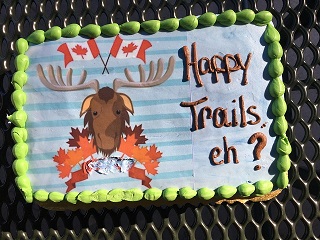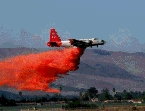| Previous :: Next Topic |
| Author |
Message |
iron
Member


Joined: 10 Aug 2008
Posts: 6392 | TRs | Pics
Location: southeast kootenays |
 |
iron
Member
|
 Thu Aug 21, 2014 4:50 pm |
|
|
http://seattletimes.com/html/localnews/2024363037_grizzlyrecoveryxml.html
| Quote: | | Nearly four decades after grizzly bears were declared threatened in the Lower 48 states, long-stalled efforts to bring the species back to Washington’s North Cascades are rolling again.
The federal government announced Thursday that it will launch an environmental analysis this fall to evaluate strategies to boost bear numbers. Among the options on the table, the most controversial is the possibility of transplanting grizzlies from healthy populations elsewhere.
“This is huge news for the Pacific Northwest and for grizzly bears,” said Joe Scott of Conservation Northwest, which has been pushing to restore grizzlies for 25 years. “This is the turning point.”
Chris Morgan, founder of the Grizzly Bear Outreach Program, said he had tears in his eyes when he heard the news. “These animals have always lived in the North Cascades, and I think they deserve an opportunity to persist and thrive there,” he said.
But not everyone is thrilled about sharing the woods with creatures that can tip the scales at more than 500 pounds, run as fast as a racehorse and wield fearsome teeth and claws.
“Grizzly bears are incredible, wonderful animals,” said Tom Davis, director of government relations for the Washington Farm Bureau. “I just wouldn’t want them living next door to me, and I think that’s how farmers and ranchers ... feel.”
The three-year analysis will determine the best approach to restoring grizzlies, and will involve extensive public debate, said Chris Servheen, of the Interagency Grizzly Bear Committee.
“It may not be universally agreed upon at the end, but at least people will know it’s not something that was cooked up in a backroom,” he said.
There’s no guarantee of action even after the process is finished, Servheen added. It all depends on funding, the lack of which is largely responsible for the slow pace of progress so far.
National Park Service Director Jonathan B. Jarvis said in a news release that the option of not restoring the bears will also be considered.
As many as 100,000 grizzlies once roamed the Western United States before trapping and bounty hunting decimated the population. Biologists estimate fewer than 20 of what some call “ghost bears” still survive in the North Cascades ecosystem — a nearly 10,000-square-mile expanse of wild country that extends from the Canadian border to Interstate 90.
The last confirmed sighting was in 2010, when a hiker photographed a grizzly munching on vegetation in North Cascades National Park. After that report, state and federal biologists launched an extensive search for grizzly scat or hair, but came up empty, Servheen said.
The North Cascades ecosystem, most of which is federal land, is one of six designated grizzly bear recovery areas, and the only one outside of the Rocky Mountains.
But while most of the other areas have active recovery programs, North Cascades has languished. When conservation groups petitioned to have the grizzlies in Washington classified as “endangered” — a more critical designation than “threatened” — the U.S. Fish and Wildlife Service agreed that the change was warranted, but said the plight of other species took higher priority.
“It has become a competition between bears and other animals, which is unfortunate,” Scott said.
A recovery plan for North Cascades grizzlies written more than 20 years ago set a population goal of 200 to 400 animals.
Those seem like big numbers, said Jack Field, executive vice president of the Washington Cattlemen’s Association.
“The biggest concern I have is that the recovery objectives are set too high,” he said.
Even though any recovery efforts will apply primarily to federal lands, a resurgence in grizzly bears is sure to affect private landowners in the area, Field added.
Ranchers in the northeastern part of the state are already dealing with livestock losses caused by the return of wolf packs, he pointed out.
And grizzlies can also pose a danger to people, Field said.
Grizzly attacks on humans are extremely rare, with an average of one fatal mauling every 10 to 15 years in the Lower 48 states, Servheen said. But in 2011, grizzlies killed two hikers in Yellowstone National Park, where the population of the bears has tripled to about 700 in recent decades.
Grizzly recovery in the Yellowstone area was accomplished mainly through measures to eliminate garbage dumps and to educate people on avoiding conflicts with bears, Servheen said.
But the population there numbered about 180 animals when the project started.
Many experts argue that it will be impossible to re-establish a healthy population of grizzlies in the North Cascades without transplanting bears to kick-start reproduction.
Over the past 15 years, biologists have trapped about a dozen bears in Canada and around Glacier National Park and released them in the Cabinet-Yaak area of northwest Montana and northern Idaho.
“We know how to move bears successfully,” Servheen said. “It’s a tool in our toolbox.”
But the idea is so contentious that the state Legislature adopted a law that forbids state agencies from importing bears. The measure may not apply to federal efforts, but it certainly would complicate things, Scott said.
Sandi Doughton at: 206-464-2491 or sdoughton@seattletimes.com |
|
| Back to top |
  
|
 |
CHECKTHISOUT
Member


Joined: 21 Jun 2012
Posts: 204 | TRs | Pics
|
Incredibly stupid. Pick the most violent and aggressive animal in the wild and put it where people recreate.
|
| Back to top |
  
|
 |
Chico
Member


Joined: 30 Nov 2012
Posts: 2500 | TRs | Pics
Location: Lacey |
 |
Chico
Member
|
 Thu Aug 21, 2014 8:03 pm |
|
|
| CHECKTHISOUT wrote: | | Incredibly stupid. Pick the most violent and aggressive animal in the wild and put it where people recreate. |
Survival of the fittest!
Glacier doesn't seem to have too many problems.
|
| Back to top |
  
|
 |
Magellan
Brutally Handsome


Joined: 26 Jul 2006
Posts: 13116 | TRs | Pics
Location: Inexorable descent |
 |
Magellan
Brutally Handsome
|
 Thu Aug 21, 2014 9:39 pm |
|
|
| CHECKTHISOUT wrote: | | Incredibly stupid. Pick the most violent and aggressive animal in the wild and put it where bears recreate. |
There, I fixed it for you.
|
| Back to top |
  
|
 |
Studebaker Hoch
Member


Joined: 04 Jul 2013
Posts: 463 | TRs | Pics
Location: eastside |
| Magellan wrote: | | There, I fixed it for you. |
I was gonna say destroy an entire species so people can recreate
|
| Back to top |
  
|
 |
olderthanIusedtobe
Member


Joined: 05 Sep 2011
Posts: 7708 | TRs | Pics
Location: Shoreline |
| Magellan wrote: | | CHECKTHISOUT wrote: | | Incredibly stupid. Pick the most violent and aggressive animal in the wild and put it where bears recreate. |
There, I fixed it for you. |
No kidding, and no other species is even close to us human beings.
|
| Back to top |
  
|
 |
AlpineRose
Member


Joined: 08 May 2012
Posts: 1953 | TRs | Pics
|
Ah, Magellan you beat me to it.
|
| Back to top |
  
|
 |
HunterConservationist
Member


Joined: 31 Jul 2008
Posts: 663 | TRs | Pics
Location: Renton, WA, USA |
Hmmm...well, okay but open up the park to hunting to keep the numbers at the management objective level.
|
| Back to top |
  
|
 |
gb
Member


Joined: 01 Jul 2010
Posts: 6309 | TRs | Pics
|
 |
gb
Member
|
 Fri Aug 22, 2014 4:34 pm |
|
|
I don't think Woodland Park allows hunting.
|
| Back to top |
  
|
 |
Backpacker Joe
Blind Hiker


Joined: 16 Dec 2001
Posts: 23956 | TRs | Pics
Location: Cle Elum |
Im not certain this will have the same NEGATIVE effect on wildlife and people that reintroducing the wolf population has had. Im not bothered by this. There are Grizzly bears in the North Cascades already!~
"If destruction be our lot we must ourselves be its author and finisher. As a nation of freemen we must live through all time or die by suicide."
— Abraham Lincoln
"If destruction be our lot we must ourselves be its author and finisher. As a nation of freemen we must live through all time or die by suicide."
— Abraham Lincoln
|
| Back to top |
  
|
 |
Drizzly Adams
Member


|
I know grizzlies like places like Montana and Wyoming, which are drier than Warshington. Can they really handle the rainy Cascades, or will it be another case of "nothing here, just passing through."
|
| Back to top |
  
|
 |
olderthanIusedtobe
Member


Joined: 05 Sep 2011
Posts: 7708 | TRs | Pics
Location: Shoreline |
| Drizzly Adams wrote: | | I know grizzlies like places like Montana and Wyoming, which are drier than Warshington. Can they really handle the rainy Cascades, or will it be another case of "nothing here, just passing through." |
They seem to do fine immediately north up in BC, so not sure that's an issue?
|
| Back to top |
  
|
 |
Drizzly Adams
Member


|
They are probably using umbearellas. 
|
| Back to top |
  
|
 |
olderthanIusedtobe
Member


Joined: 05 Sep 2011
Posts: 7708 | TRs | Pics
Location: Shoreline |
| Drizzly Adams wrote: | They are probably using umbearellas.  |
 We'll have to ask some Alaskan brown bears how they manage to deal with the precipitation.
We'll have to ask some Alaskan brown bears how they manage to deal with the precipitation.
|
| Back to top |
  
|
 |
joker
seeker


Joined: 12 Aug 2006
Posts: 7953 | TRs | Pics
Location: state of confusion |
 |
joker
seeker
|
 Sat Aug 23, 2014 9:05 am |
|
|
| Drizzly Adams wrote: | | I know grizzlies like places like Montana and Wyoming, which are drier than Warshington. Can they really handle the rainy Cascades, or will it be another case of "nothing here, just passing through." |
|
| Back to top |
  
|
 |
|
|
You cannot post new topics in this forum
You cannot reply to topics in this forum
You cannot edit your posts in this forum
You cannot delete your posts in this forum
You cannot vote in polls in this forum
|
Disclosure: As an Amazon Associate NWHikers.net earns from qualifying purchases when you use our link(s). |